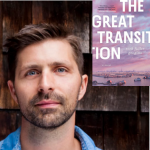
- This event has passed.
Sustainability Series: The Great Transition – Climate Futures Predicted and Imagined
September 27, 2023 @ 5:30 pm - 7:00 pm

How do we imagine and predict our climate future amid so much change and uncertainty? How do different perspectives inform those predictions? Join author Nick Fuller Googins, whose new speculative novel The Great Transition is out now, as he leads a discussion on these questions and more. Googins will be joined by Ania Wright of Maine Youth for Climate Justice and the Sierra Club and Dr. Dave Reidmiller, Director of the Climate Center at the Gulf of Maine Research Institute. The panel will discuss how novelists, scientists, and activists imagine our future, how and whether those visions are in concert or in conflict, and what we can all take away from imagining what is to come.
Sustainability Series: The Great Transition – Climate Futures Predicted and Imagined
Date of Event: 9/27/2023
Time of Event {start time & end time}: 5:30pm-7:00pm
Location of Event: Rines Auditorium
GUEST SPEAKERS:

Nick Fuller Googins is the author of the novel The Great Transition (Atria Books). His short fiction and essays have appeared in The Paris Review, Men’s Health, The Sun, The Los Angeles Times, and elsewhere. He lives in Maine, and works as an elementary school teacher. He is a member of the Maine Writers & Publishers Alliance, as well as the National Education Association, the largest labor union in the United States.

Ania Wright is the Political & Legislative Specialist for Sierra Club Maine. Ania recently graduated from College of the Atlantic, where she majored in Human Ecology with a focus in Environmental Policy and Climate Justice. She has been extensively involved in climate justice activism in the State of Maine as a founding member of MYCJ. She also sits on the board of Maine Climate Action Now. Ania is also serving as the Youth Representative to the Maine Climate Council, where she is working with her fellow representatives to write a new Climate Action Plan for Maine. Ania lives in Portland.

Dr. Dave Reidmiller, Ph. D., is the inaugural Climate Center Director at GMRI. In his role, Dave leads an interdisciplinary team of experts to co-develop climate services with coastal and marine stakeholders. The Climate Center employs a user-centered Science—Engagement—Solutions framework to deliver upon this aim with a view to ensuring coastal communities can thrive in a warmer world.
Prior to joining GMRI, Dave served in a variety of senior positions for the federal government. As Acting Director of the Northeast and Southeast Climate Adaptation Science Centers (CASC) with the U.S. Geological Survey, he oversaw a unique partnership between the federal government and university consortia to advance and deliver science to help fish, wildlife, habitat, and people adapt to a changing climate. Before joining the CASC Network, Dave directed the Fourth National Climate Assessment as part of the White House Office of Science and Technology Policy, where he coordinated the work of 300+ volunteer experts from across the country in an effort to understand and address climate risks facing the nation. Dave has deep international climate science policy experience, as well, having served in the State Department’s Office of Global Change for five years under the Obama Administration, where he led U.S. engagement in the Intergovernmental Panel on Climate Change and was the lead U.S. science and technology negotiator for the Paris Agreement. Dave also served as a Fellow in the U.S. Senate where he advised Senator Mark Udall on a range of energy, environment, and public lands issues, as well as a Mirzayan Fellow at the National Academies of Sciences, Engineering, and Medicine.
Dave grew up in Rochester, New York, and attended Colgate University as an undergraduate to study chemistry. Wanting to better understand the natural world and how humanity can impact it, Dave pursued graduate studies in the Department of Atmospheric Sciences at the University of Washington. During his time in Seattle, Dave became increasingly drawn to the nexus of science and policy, ultimately paving the path for a post-graduate life serving to bridge the technical and policy worlds as they relate to climate change — ensuring the best available science is used appropriately to inform near- and long-term decisions facing communities.
